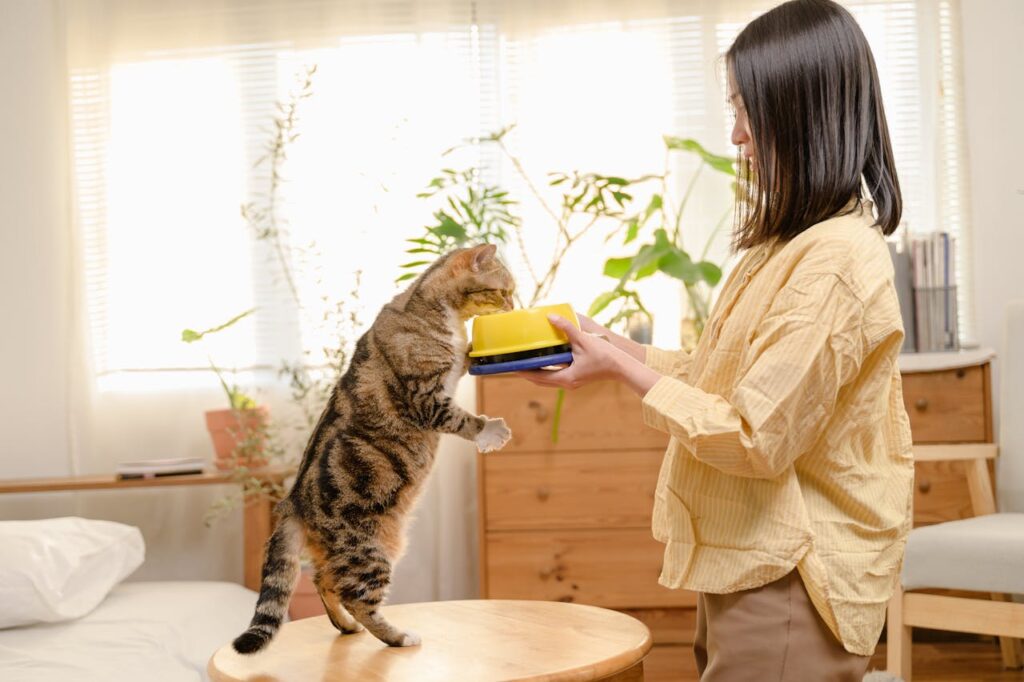
Pomegranates began to appear as early as the 5th millennium BC in the region that lies between modern-day Iran as well as northern India. They have served as symbols of prosperity, fertility, and abundance across various cultures throughout many thousands of years. They’re often connected to life, renewal and the promise of eternal living. They are utilized in many recipes throughout the US, such as cocktail recipes, salad dressings, sauces, and desserts. Additionally, they have several uses within the wellness and health sectors due to their potent health benefits.
Are cats allowed to eat Pomegranate?
Though pomegranates do not cause any harm and may be eaten by cats, there are a number of dangers that can be incurred by including the fruit in your pet’s food. There are a few negatives to including pomegranate in your cat’s food list that outweigh the benefits, and we would not suggest fruit as a great food feature for your cat.
Are cats attracted to Pomegranate?
Cats often are enthralled by the food they consume, drawn to the scents and colours that appear in our food, even though they don’t enjoy the taste of fruit or some other foods. If your cat is interested in having a taste of pomegranate, would they be allowed to take an ounce?
Are Pomegranate fruits good for cats?
A cup of approximately the weight of 174 grams contains the following –
- Calories: 144
- The Total carbohydrate content: 37.7 grams
- Dietary Fiber 7 grams
- Sugar: 24.7 grams
- Protein: 3 grams
- Vitamin C: 28.8 milligrams
- Vitamin K: 46.2 micrograms
- Folate: 66.1 micrograms
- Potassium: 399 milligrams
The fruits contain antioxidants, too. Even though humans are able to get all these vitamins, cats are unable to reap all the benefits.
Health Benefits of Pomegranate for Cats
Pomegranates are low in calories, and they are free of cholesterol and saturated fats. They are rich in fibre and can aid digestion for kitties. Vitamin K, potassium, and folic acids that are found in this fruit all help maintain the health of the red blood cells. Folic acids also help reduce fat levels and support your cat’s development and growth in its later years.
But there are some potential dangers when feeding your cat with pomegranates. Cats’ digestive systems are not equipped to handle the various compounds in pomegranate, such as tannins, as well as some acids. As a result, certain cats may experience an upset stomach following taking the fruit. The seeds of pomegranate pose a choking threat to your cat. Therefore, it’s excellent to keep this berry from their diet.
Risks of Pomegranate for Cats
Digestive upset The arils and seeds of pomegranate are loaded with tannins as well as some acids that are challenging for the cat’s digestive system to digest. Therefore, while a tiny amount of pomegranate won’t cause vomiting in your cat if they are eating excessive amounts, they could be prone to stomach upset and diarrhea. There are also various digestive problems in cats.
Choking Danger: The seeds from pomegranate are at risk of choking for cats. When a cat is fed the seeds of a pomegranate, there’s an increased risk of them getting lodged in the throat or blocking digestion. Learn from this article what you can do in the event that your cat is suffering from choking.
Allergic Reactions Cats could experience an allergic reaction to the pomegranate fruit, causing symptoms such as itching, inflammation of the skin and gastrointestinal discomfort.
A nutritional imbalance The pomegranate fruit isn’t a component of the cat’s diet, and it does not offer the necessary nutrients needed for the well-being of cats. Introducing pomegranate into a diet as a supplement could alter the balance of nutrition in the diet of a cat. Find out how to eat and nutrition tips to benefit your pet!
How Much Pomegranate is Okay for Your Cat?
The most fundamental thing to comprehend is the fact that cats are carnivores. Therefore, the majority of your needs for nutrition should come through meat and other cat food. It is not advisable to make pomegranate a component of your cat’s daily food intake, and it should be fed as treats on occasion or treats when it is available.
Can Cats Have Pomegranate Juice?
It’s not advised to give pomegranate juice to cats. As with the fruit itself, the juice of pomegranate is not an element of the cat’s diet and could pose a risk to the health of your pet. It is a concentrated source of the chemicals present in the fruit, which include tannins and certain acids that are hard for your cat’s digestive system to handle.
Conclusion
Pomegranates bring several advantages to people. However, when it comes to cats, some risks outweigh the benefits. So, although these fruits aren’t harmful, we don’t recommend their inclusion into your pet’s diet because of the danger of choking that seeds can pose.
